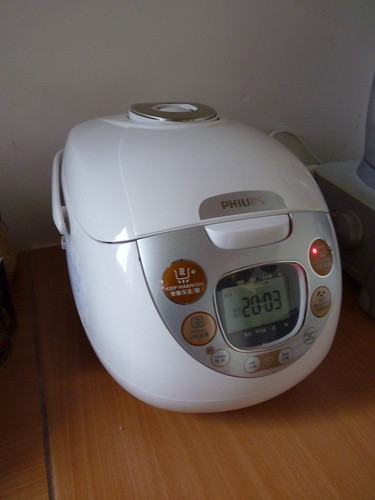Rice cooker update
So it’s been about six months, and I thought I’d report a bit on our experience with the rice cooker.
First, a word of warning: this isn’t going to be a post of great revelations about rice cookers–it’s mostly us discovering obvious things. If you already know about rice cookers, especially high-end models, you can probably skip this blog post. We feel very much like we’ve just discovered something half the world already knows about…
I was very ambivalent about the appliance at first, thinking it a big investment with little return–after all, I could already cook rice at home without too much trouble, so why pay so much for a dedicated machine? (I did want a rice cooker, but one of the cheaper models. The H was the one who convinced me to get a high-end, fuzzy logic cooker).

Our rice cooker. It’s a Philips HD4751 (yeah, I know. Philips isn’t a company you’d associate with rice cookers, but they’ve recently started expanding into Malaysia and Singapore, and their electronics are CE-certified. See below for why this matters)
The biggest pro by far is freeing space on the stove–it might not look like much, but so many Asian dishes require cooking ingredients separately, and the four spots on the stove can get crowded very fast–especially if one of them is a huge wok, which tends to eat into the space of the other spots…
Second obvious pro: cooking rice on the stove is fairly easy (as long as you’re not cooking glutinous rice or Japanese short grain rice, which I’m given to understand is a little more complicated), but it does require a bit of attention. By contrast, the rice cooker pretty much takes care of itself: once the rice and water are in, I can go do other things (like chopping up vegetables or preparing a marinade), secure in the knowledge that I won’t have a burnt mess at the bottom of the casserole dish. All I have to do is open up the thing when the timer runs out, and fluff it a bit so that the rice doesn’t stick together, and then close it again–and it stays inside snug and warm until the rest of the ingredients are actually cooked (I’m given to understand the long keep-warm function is one of the big advantages of a higher-end model like ours; the cheaper ones don’t work so great).
The thing also handles other kinds of rice: sushi rice (which was handy for our few forays into Japanese cuisine); brown rice (which is nigh-impossible to cook on a stove), and cháo (congee/rice porridge). Cháo can be made on the stove, but again, the rice cooker makes it much more convenient.
Also, it has a steaming setting! See, the H and I both love dim sum, in particular ha kau, cha siu buns and other classic Chinese dishes. Accordingly, we tried several options for steaming our dim sun. Metal baskets, bamboo baskets, baskets lined with baking paper or foil (and believe me, piercing dozens of holes in baking paper or foil in order to let the steam pass is one of the most soul-destroying activities in the kitchen)… The steaming bit worked great, but what didn’t work was the get-the-dumplings-out-the-basket-without-tearing-them-apart bit. In other words, the damn things tended to stick to the hot surface, which made it very hard to get some decent-looking meals.
Our rice cooker, on the other hand, comes with a plastic white basket which slots over the main reservoir–and things actually don’t stick to it. I’m in love. Plus, you can cook rice and dim sum at the same time (the dim sum get cooked by the steam from the rice). Win!
Cons: if you don’t eat enough rice, of course, it’s pretty much a worthless investment. On the other hand, I’ve found that our global consumption of rice in the household increased–rice suddenly became as lazy an option as pasta when we both came home knackered from the day job.
One thing I do miss is the burnt bits at the bottom (they have a special name in Vietnamese, but I can’t remember for the life of me what it is). When they’re not charred, but just the right shade of golden, they make for delicious eating, and of course you can’t get those with a rice cooker, which makes perfect rice every time…
One minor con: we did need to get hold of someone who spoke Traditional Chinese before we could use the thing. As you can see, everything on it is labelled in Chinese characters, which can be a bit of a drawback when the instruction booklet isn’t explicit: it did include numbered diagrams, but it also suffered from a flaw I’ve often seen in Philips instruction booklets, which is that there are numbers missing, rendering the system pretty much useless. Thankfully, an amazing number of people showed up here, on FB and on LJ to help us interpret the labels.
Last con if you live in Europe: getting hold of the %% thing in the first place. Most rice cookers sold in the 13th Arrondissement (our local Chinese/Vietnamese district) are simpler models–most high-end rice cookers are made for the Asian markets, and are not CE-certified, which prevents them from being imported in Europe. It took us a whole afternoon to find this one.*
So, overall, very happy with the purchase. Coming late to the whole concept (or, indeed, the whole cuisine thing :-p), but definitely a fan. We’re probably one of the few French households with a sophisticated rice cooker and no coffee-maker whatsoever…
* Yes, we could probably have asked one of our numerous friends living in Asia to buy one for us, and bring it back–the thought didn’t occur to us until it was far too late…